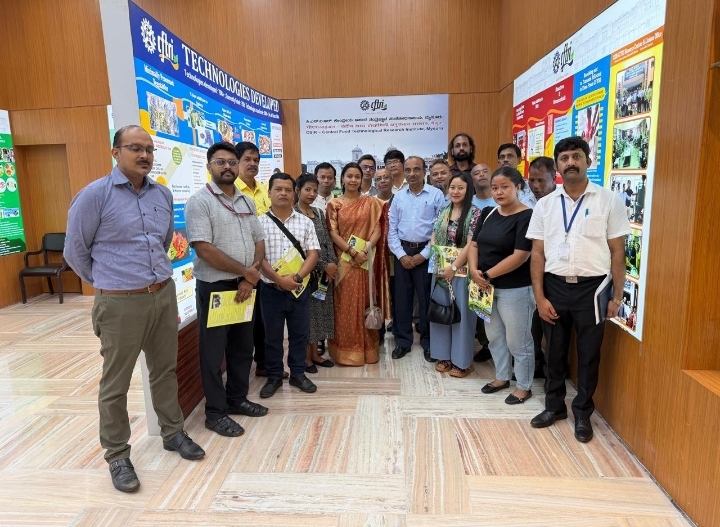Shillong: A delegation of senior journalists from Meghalaya and Tripura visited the CSIR-Central Food Technological Research Institute (CFTRI), Mysuru, as part of a press tour organised by the Press Information Bureau, Shillong. The tour aimed to enhance media engagement with premier national research institutions and spotlight innovations that hold transformative potential for the North Eastern Region.
The journalists were taken through a comprehensive briefing by Dr. Ramesh Kumar, Senior Scientist, who shared insights into the institute’s legacy, milestones and impact across India’s food technology sector. Established in 1950, CSIR–CFTRI operates under the Council of Scientific & Industrial Research (CSIR), Ministry of Science & Technology, and has played a pioneering role in transforming India’s post-independence food security landscape.
With a legacy spanning over seven decades, CFTRI has developed more than 1,000 food technologies, issued over 4,100 industrial licenses, and currently has around 400 ready-for-transfer technologies available to entrepreneurs and startups. Its focus spans the entire food value chain, from crop-based innovation and food safety to processing, packaging, nutrition and sustainability.
Highlighting CFTRI’s historic contributions to India’s nutrition and food fortification efforts, Dr. Ramesh Kumar recalled the groundbreaking innovation – Amulspray, one of CFTRI’s most remarkable success stories. He narrated how an “unthinkable” feat was achieved when the scientists of CSIR-CFTRI successfully formulated an infant food using buffalo’s milk-at a time when only cow’s milk was considered suitable for such formulations. The innovation, developed in 1957, made India self-reliant in infant food production.
He fondly recalled the names of several dedicated scientists who were behind this success story, emphasizing that Amulspray became not only a technological triumph but also a symbol of India’s scientific ingenuity and commitment to public nutrition.
During the visit, the delegation was introduced to several recent innovations developed by CFTRI scientists. These included biodegradable plates and edible cutlery made from millet-processing by-products – an eco-friendly solution aligned with India’s Millet Mission. Another breakthrough was the development of gluten-free bread premixes from minor millets such as foxtail and proso, a technology particularly relevant for health-conscious consumers and celiac patients.
Also on display was the institute’s innovative probiotic carrot nectar, a non-dairy beverage rich in vitamin A and fortified with beneficial bacteria, providing a nutritional alternative for populations with limited access to dairy. In another notable advancement, CFTRI’s ethylene scavenger technology, which extends the shelf life of fresh fruits like pineapples, bananas and papayas by reducing ripening agents, was demonstrated. This innovation is especially significant for the North East, which produces an abundance of perishable horticultural crops.
Another major area of focus during the visit was CFTRI’s commitment to addressing post-harvest losses and value addition-a critical concern for the agricultural sector, particularly in the North East. India continues to lose a significant portion of its fruits, vegetables, and grains to post-harvest spoilage, which not only undermines farmer incomes but also contributes to national food insecurity.
In response, CFTRI has developed a range of post-harvest technologies and training programmes aimed at improving farm-to-market efficiency. These include protocols for scientific sorting, drying, dehydration, canning and low-cost packaging solutions that can be implemented at the village or district level. Farmers and self-help groups across the country are being trained in these techniques through CFTRI’s Integrated Skill Development Initiatives, with particular outreach to the North Eastern states.
The institute’s work in value addition-converting perishables into shelf-stable, ready-to-consume products-has empowered numerous rural entrepreneurs. For example, fruits that would otherwise spoil due to lack of storage or transport can now be processed into concentrates, dried snacks, or beverages using CFTRI’s technologies. These value-added products not only command higher prices but also open up opportunities for rural branding and export.
In addition, CFTRI has championed waste-to-value innovations, such as extracting gelatin from fish processing waste-particularly relevant to fishery-rich regions like Tripura and developing biodegradable packaging materials from crop residues. These solutions reflect a holistic approach to food processing that integrates sustainability with profitability.
During an interactive session, journalists shared region-specific challenges and suggested avenues for deeper collaboration between CFTRI and local institutions in the North East, including agricultural universities, state food processing departments, and farmer-producer organisations. They emphasized the potential for establishing decentralized processing hubs, training rural youth in post-harvest handling, and promoting millet-based enterprises through technology transfer.
The delegation concluded the visit with a renewed understanding of how science and technology can drive inclusive growth, especially in regions with untapped agro-economic potential. CFTRI’s work, they noted, is not only relevant to national food policies but also deeply aligned with the developmental priorities of India’s frontier regions.


